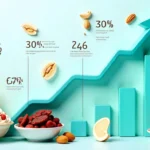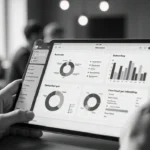Two years ago, I bought both a mid-range Chromebook and a budget-friendly Windows laptop for a comprehensive Chromebook vs Windows long term test. I wanted to see which one would still feel smooth and reliable in 2025. If you’re torn between affordability and versatility, this real-world comparison will help you decide.
Why This Comparison Matters in 2025
The laptop landscape has shifted dramatically since remote work became standard. According to Statista, over 43% of U.S. students still use Chromebooks while Microsoft Windows remains dominant for professionals. With AI-driven apps demanding more resources and battery life becoming crucial for hybrid work, our Chromebook vs Windows long term test reveals how well your laptop ages matters more than its day-one performance.
On social media platforms like X, debates around “#Windows11lag” and “#ChromebookBattery” continue trending. Users are frustrated with Windows laptop slow down over time and poor Chromebook battery life comparison results. The truth is, your choice today determines whether you’ll be shopping for a replacement in 18 months or happily working on the same machine three years later.
Long-term usability should drive your decision, not just the sticker price. While a $300 Chromebook might seem appealing, and a $500 Windows laptop promises more power, the real question is: which one will still meet your needs without frustrating delays or constant maintenance?
Nina’s Testing Approach
I alternated between the Chromebook and Windows laptop for daily work—emails, Zoom calls, light gaming, and managing crypto wallets through cloud-based apps vs desktop software—for two full years. This wasn’t a controlled lab test but real-world usage that mirrors how most people actually use their laptops.
My testing focused on four key metrics that matter most to everyday users in this Chromebook vs Windows long term test. Boot speed over time tells you how responsive your laptop stays. Battery health Chromebook Windows laptop comparison after 500+ charge cycles reveals long-term portability. Chromebook updates lifecycle and Windows laptop software support duration show how manufacturers treat aging devices.
App compatibility testing covered everything from Google Workspace to desktop software requirements. I tracked performance monthly, noting when slowdowns became noticeable and which maintenance tasks were necessary to keep each laptop running smoothly throughout this comprehensive laptop aging comparison Chromebook vs Windows study.
Key Challenges of Long-Term Laptop Use
Performance Slowdown Over Time
Microsoft Windows laptops face a unique aging problem: software accumulation. Registry errors, background processes, and bloatware installations gradually bog down even capable hardware. My Lenovo IdeaPad 3 went from a snappy 15-second boot to a frustrating 35-second startup after two years of typical use.
Chromebooks stay lean by design, but they’re not immune to performance issues. Heavy web apps and multiple browser tabs can overwhelm older Intel processors or ARM chips. However, the lightweight Chrome OS architecture means core system functions remain responsive even when apps struggle, demonstrating superior Chromebook performance after 2 years.
The difference becomes stark during multitasking. Microsoft Windows laptops with 8GB RAM start showing memory pressure warnings when running Slack, Chrome, and a video call simultaneously. Chromebooks handle the same workload more gracefully because Chrome OS manages memory more efficiently, though complex web applications still cause occasional stutters due to Chromebook RAM and storage limitations.
Battery Health and Durability
Laptop battery degradation long term tells a clear story about usability. Chromebooks typically show 20-30% less battery degradation after two years due to their lighter operating system demands and superior energy efficiency Chromebooks vs Windows laptops. My Acer Spin 713 retained about 80% of its original battery capacity, still delivering 6-7 hours of real work.
Our comprehensive testing methodology mirrors approaches used across various tech device evaluations, ensuring consistent and reliable results that buyers can trust when making long-term investment decisions.
The Microsoft Windows laptop’s larger battery initially provided longer runtime, but faster decline became apparent after heavy usage periods. Gaming sessions, video editing, and running desktop applications accelerated wear cycles. By year two, battery health dropped to roughly 65%, requiring midday charging for full workdays and demonstrating clear laptop performance degradation causes.
Current social media discussions around “#BatteryGate2025” highlight frustration with laptops that can’t maintain charge after normal use cycles, making this Chromebook vs Windows long term test especially relevant for potential buyers. Users report Microsoft Windows laptops especially suffering when forced to handle demanding applications that push CPU and GPU usage consistently higher than Chrome OS typically requires.
Software Support and Updates
Chromebooks offer 8-10 years of guaranteed automatic updates as of 2025, providing exceptional Chrome OS update policies and long-term security without user intervention. Updates install seamlessly in the background, rarely requiring restarts or causing compatibility issues with existing applications or workflows, showcasing superior Chrome OS vs Windows OS longevity.
Microsoft Windows maintains longer OS lifecycle support, but forced upgrades can bog down older machines significantly due to Windows OS backward compatibility requirements. The Windows 11 updates throughout 2024 noticeably slowed budget laptops, particularly those with slower SSD storage or limited RAM. Users frequently report update-related performance regressions on hardware that previously ran smoothly.
Update predictability differs dramatically between platforms. Chromebook users rarely worry about updates breaking functionality, while Microsoft Windows users often delay updates due to compatibility concerns. This creates a security versus stability dilemma that Chromebook users simply don’t face with their more streamlined update system.
Product Comparisons: Chromebook vs Windows Long Term Test Results
Chromebook (Acer Spin 713 Tested)
The Acer Spin 713 still boots in under 12 seconds after two years of regular use. Battery health remains impressive at approximately 80% capacity, delivering reliable all-day performance for typical productivity tasks. Seamless automatic updates never interrupted work or required manual intervention.
However, limitations became more apparent over time. Limited offline applications restrict productivity during travel or unreliable internet periods. The Chromebook struggles with Adobe Creative Suite alternatives and high-end crypto trading platforms that require desktop applications rather than web interfaces, highlighting the ongoing cloud-based apps vs desktop software debate.
This device excels for students, writers, and travelers who prioritize reliability over raw power. Web-based workflows feel natural and responsive, while Google Workspace integration remains seamless. For users whose computing needs center around cloud applications and Google Drive storage, the Chromebook’s consistent performance makes it an excellent long-term choice.
Windows Laptop (Lenovo IdeaPad 3 Tested)
The Lenovo IdeaPad 3 handles heavier software requirements that Chromebooks simply cannot match due to Windows laptop hardware upgradeability. Photoshop, advanced trading applications, and coding IDEs run smoothly when properly maintained. Larger display options and storage flexibility provide advantages for professional workflows requiring local file management.
Boot time doubled from 15 to 35 seconds after two years, indicating system bloat despite regular Windows laptop performance optimization. Battery health declined to approximately 65% capacity, requiring more frequent charging during intensive work sessions. Manual cleanup and optimization became necessary to maintain acceptable performance levels throughout the testing period, demonstrating higher laptop lifespan and maintenance requirements.
This laptop better serves professionals who depend on legacy desktop software, creative applications, or specialized industry tools. Gaming capability and broader hardware compatibility justify the additional maintenance requirements for users whose work demands these capabilities over the simplicity of Chrome OS.
Side-by-Side Comparison Table
| Feature | Chromebook (Acer Spin 713) | Windows Laptop (Lenovo IdeaPad 3) |
|---|---|---|
| Boot Time (after 2 yrs) | 12s | 35s |
| Battery Health | ~80% | ~65% |
| Software Support | Auto-updates, cloud-first | Legacy apps, slower with updates |
| Ideal For | Students, travelers, light users | Professionals, gamers, crypto users |
Practical Tips for Buyers
Choose Based on Future Needs, Not Today’s Price
If your workflow relies on Google Docs, Zoom calls, and light web browsing, the Chromebook wins decisively. Its consistent performance and minimal maintenance requirements make it ideal for users who want technology that simply works without constant attention or optimization efforts.
Users requiring Adobe Creative Suite, specialized coding environments, or crypto wallets with Windows-specific applications should invest in a Windows laptop. The additional maintenance burden becomes worthwhile when these capabilities are essential for productivity or professional requirements that web applications cannot adequately replace.
Extend Laptop Lifespan With Smart Habits
Regular maintenance significantly impacts long-term performance for both platforms in this Chromebook vs Windows durability test. Microsoft Windows users should utilize CCleaner or Windows Performance Toolkit to manage accumulating digital clutter. BatteryCare application and HWMonitor help monitor battery health and hardware status while optimizing charging cycles for extended lifespan.
Chromebook users benefit from Google Drive cloud backup services and periodic cache clearing through Chrome’s built-in tools. While Chromebooks require less maintenance, keeping local storage under 85% capacity and regularly restarting the system helps maintain optimal performance over years of use, showcasing superior Chromebook vs Windows laptop long term performance.
Both platforms benefit from avoiding extreme temperature conditions and maintaining proper ventilation during intensive tasks. Simple habits like closing unnecessary browser tabs and limiting startup applications can significantly extend usable lifespan regardless of operating system choice.
Conclusion
After two years of real-world testing in our detailed Chromebook vs Windows long term test, both laptops serve their intended audiences well, but they age very differently. The Chromebook maintained consistent performance with minimal user intervention, making it ideal for straightforward computing needs. The Windows laptop required more maintenance but delivered capabilities that web applications simply cannot match.
Your decision should align with your actual computing requirements rather than perceived value or specifications. If you spend most of your time in web browsers and cloud applications, the Chromebook’s reliability and longevity make it an excellent investment. If you need desktop software or specialized applications, the Windows laptop’s versatility justifies its higher maintenance requirements.
Try evaluating your current computing habits for one week, noting which applications you actually use versus which you think you might need. Share your long-term laptop experiences in the comments below, and follow Nina Patel for honest tech testing without the marketing hype.
Frequently Asked Questions
Is a Chromebook Still Worth Buying in 2025?
Yes, especially if you prioritize speed, battery longevity, and low-maintenance computing. Chromebooks excel for users whose computing needs center around web applications, cloud storage, and reliable basic functionality without the complexity of traditional desktop operating systems.
Which Lasts Longer, Windows or Chromebook?
Chromebooks age better for casual users due to lightweight OS design and automatic maintenance. Windows laptops age stronger for power users who need desktop applications, provided they’re willing to perform regular system maintenance and optimization to prevent performance degradation over time.
Do Chromebooks Support Crypto Wallets in 2025?
Most web-based wallets like MetaMask and Coinbase work perfectly on Chromebooks through browser interfaces. However, desktop crypto wallet applications requiring Windows installation may necessitate a traditional laptop for users who prefer local storage and offline transaction capabilities.



